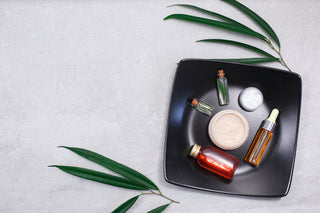Retinol has been used in skincare since the 1970s -- but what is it exactly? And why have people been using it for so long? Let’s take a deeper look at this ingredient that dermatologists have been recommending we use for generations.
Retinol -- also known as Vitamin A, Retin-A, or Retinoid -- is actually often the umbrella term used to refer to a family of ingredients that include Retin-A (or Retinoic Acid) and Retinol, along with other ingredients in Vitamin A that boost your immune function, repair tissue damage, and improve your eyesight. However, only Retin-A and Retinol are used in skincare.
Retin-A and Retinol are powerful acne fighting, anti-aging additives that help resurface the skin and reduce fine lines by sloughing off the uppermost layer of the epidermis while plumping the deeper dermis layer and encouraging collagen production. They have been used to decrease inflammation, oil production, and the appearance of sun damage. In addition, they also kill the bacteria that causes acne and they unclog and shrink pores.
Retin-A is the stronger of the two ingredients and can be prescribed by doctors to treat deep wrinkles and more serious skin conditions -- but too much can cause dryness and irritation. Over-the-counter Retinol is a much gentler option, especially for sensitive skin, so anyone can use it! In fact dermatologists recommend starting a Retinol regimen for everyone as early as 22-25 to help prevent deep wrinkles from forming as they age. The key is to use it consistently as directed in order to see results.
If you’ve never used Retinol before, we recommend starting by introducing it slowly and watching how your skin reacts. You can apply it at night before your moisturizer -- or if your skin is more sensitive, apply it after! Just make sure your face is completely dry before you slather it on, avoiding the eye area. You can do this two nights on and two nights off and increase the frequency and potency of your products as you acclimate after a few weeks. Don’t forget to always apply sunscreen the morning after as Retinol can make your skin more sensitive to UV light. You should begin to see results after a couple of months!
We hope we’ve given you the confidence to try adding Retinol to your skincare routine. It might just be the anti-aging miracle you’ve been searching for! Check out LuminaNRG.com for more information.

